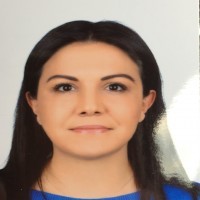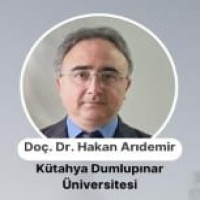Research Article
Book Review
Review Article
Issue Editorial Board


Issue Reviewers


ÖZGEÇMİŞ
1. Adı Soyadı: İmren Arbaç
2. Doğum Tarihi: 1965
3. Unvanı: Dr.
4. Öğrenim Durumu: Lisansüstü
Derece Alan Üniversite Yıl
Lisans Rus Dili ve Edebiyatı Ankara Üniversitesi 1987
Y. Lisans Rus Dili ve Edebiyatı İstanbul Üniversitesi 2014
Doktora Tarih Yeditepe Üniversitesi 2021
5. Akademik Unvanlar:
Yardımcı Doçentlik Tarihi :
Doçentlik Tarihi :
Profesörlük Tarihi :
6. Yönetilen Yüksek Lisans ve Doktora Tezleri
6.1. Yüksek Lisans Tezleri
6.2. Doktora Tezleri
7. Yayınlar
7.1. Uluslararası hakemli dergilerde yayınlanan makaleler (SCI & SSCI & Arts and Humanities)
1. Arbaç, İmren, “İkinci Dünya Savaşında Cephedeki Sovyet Kadınları”- Kesit Akademi Dergisi, Eylül 2019, Sayı:20, s.244-265. ISSN:2149-9225, http://dx.doi.org/10.29228/kesit.23476
7.2. Uluslararası diğer hakemli dergilerde yayınlanan makaleler
7.3. Uluslararası bilimsel toplantılarda sunulan bildiriler ve bildiri kitabında (Proceedings) basılan bildiriler
1.Arbaç, İmren, “Role of International Cooperation in The Field Of Language Learning” (Роль международного сотрудничества в области изучения языков) International Conference Innovative Development of Territories In The Era of Globalization (Инновационное развитие регионов в условиях глобализации), Rusya İvanovo Devlet Üniversitesi, Rusya, İvanovo, Eylül 2015.
2.Arbaç, İmren, “Türkiye Cumhuriyeti Devrimlerinin Halka Anlatılmasında Narodniklerin Rolü” I. Uluslararası Türk Kültürü ve Tarihi Sempozyumu,Yeditepe Üniversitesi, Tarih Bölümü, 19 – 20 – 21 Nisan 2018.
7.4. Yazılan uluslararası kitaplar veya kitaplarda bölümler
Kitap Bölümü- Siyasi, Sosyal ve Kültürel Yönleriyle Türkiye ve Rusya – 2 E- Siyasal Yaşam ve ilişkiler:“Türk-Sovyet İlişkilerinde Şükrü Saraçoğlu’nun 26 Eylül-16 Ekim 1939 Moskova Görüşmelerinin Önemi”, Siyasi, Sosyal ve Kültürel Yönleriyle Türkiye ve Rusya -2-, birinci bs., ed. Osman Köse, Berikan Yayınevi, Ankara, 2019, s.129-145. ISBN: 978-605-7634-12-2.
Kitap Bölümü: Siyasi, Sosyal ve Kültürel Yönleriyle Türkiye ve Rusya – 3: “Türkiye Ve Sovyetler Birliği Arasında Normalleşme Dönemindeki Diplomatik İlişkilerin İki Ülke Basınında Yansımaları”, birinci bs., ed. Muhammet Mücahit Küçükyılmaz, ISBN 978-605-7634-98-6 Berikan Yayınevi , Ankara, 2019, s.121-141.
7.5. Ulusal hakemli dergilerde yayınlanan makaleler
Arbaç İmren, “Taksim Cumhuriyet Anıtı’nda Rus – Türk Yakınlaşmasının Sembol Figürü” Tarih Bölümü Araştırma Dergisi Department of History Research Journal (E-isnn:2564-7687), Ocak 2017, sayı 1, s.138-161.
Arbaç, İmren, “Milli Mücadele Dönemi Rus Türk İlişkilerinde Yeşil Ordu-Çerkez Ethem –Mustafa Suphi Ve Arkadaşları Üçgeni” Tarih Bölümü Araştırma Dergisi Department Of History Research Journal (E-İsnn:2564-7687), Haziran 2017, Cilt 1 - Sayı 2, S.38-54.
Arbaç, İmren, “1923-1938 Yılları Arasında Türk-Sovyet Ekonomik ve Siyasi İlişkileri”- ATESE ATATÜRK HAFTASI ARMAĞANI DERGİSİ, 10 KASIM 2019, Genel Kurmay Personel Başkanlığı Askeri Tarih ve stratejik Etüt (ATASE) Daire Başkanlığı Yayını, ISSN:1303-2658, Sayı: 46, Ankara, Kasım 2019, s.35-61.
7.6. Ulusal bilimsel toplantılarda sunulan ve bildiri kitabında basılan bildiriler
Arbaç, İmren, Yeditepe Üniversitesi’nin 25. Yılında Genç Bakışlardan Cumhuriyet Tarihi Lisansüstü Öğrenci Çalıştayı 5 Şubat 2021, İstanbul, Yeditepe Üniversitesi, Atatürk İlkeleri ve İnkilap Tarihi Enstitüsü, “1960-1964 Yılları arasında Türkiye ve Sovyetler Birliği İlişkileri”. (Bu makale Yeditepe Üniversitesi Tarih Bölümü dergisinde yayımlanmak üzeredir).
7.7. Diğer yayınlar
1.Adım Adım Rusça, Rusça Gramer Kitabı, Multilungual Yayınevi, İstanbul, 2002.
2. Davayte uçit russkiy yazık A1.1 İSTEK Yayınları 2019 Kasım, İstanbul.
3. Davayte uçit russkiy yazık A1.2 İSTEK Yayınları 2020 Kasım, İstanbul.
4.Yüzyıl Yaşa Yüzyıl Sev, Valentin Rasputin, Çev.İmren Arbaç, Bebekus’un Kitapları, İstanbul,1992.
5. Век живи век люби, Multilungual Yayınevi, İstanbul, 1998.
6. Fransızca Dersleri, Berikan Yayınevi, İstanbul, 2021.
7.Yüzyıl Yaşa Yüzyıl Sev, Valentin Rasputin, 2. Bs., Çev.İmren Arbaç, , İstek A.Ş. Yayınları, İstanbul, 2021.
8. Projeler
9. İdari Görevler
10. Bilimsel ve Mesleki Kuruluşlara Üyelikler
11. Ödüller: Rusya Federasyonu İrkutsk Yerel Kültürler Tarih Müzesi Tarafından Sanata Yapılan Katkı İçin Verilen Teşekkür Belgesi, İrkutsk 2020, Müze Müdürü S.G. Stupin.
Aim & Scope
Journal of International Relations and Political Science Studies aims to include different dimensions of current debates in international relations in each issue. The journal aims to approach current developments in international relations from a scientific and critical perspective and to offer a universal perspective. In this context, JIRPSS has adopted the principle of collaborating with national and multinational institutions, organizations, foundations, and reinforcing the knowledge of academics in the field with the contributions of non-governmental organizations and bureaucrats.
Journal of International Relations and Political Science Studies aims to bring together the works of graduate students, young researchers and academicians under the same roof. In this respect, the journal also undertakes a mission of continuing education.
Journal of International Relations and Political Science Studies includes original researches and book reviews on international relations, international politics, international political economy, international law, global energy, international migration, international security.
Author Guidelines
English-written studies do not need to add Turkish abstracts.
Articles and book reviews that do not comply with the spelling rules and citation format will be returned to the authors without being evaluated.
An abstract article not exceeding 250 words should be written at the beginning of the article and keywords consisting of 5 words should be added. If the article is written in Turkish, the Turkish abstract and keywords should also be prepared in English; if the article is written in English, the Turkish abstract and keywords are not needed.
References should be made in the text based on the APA 7th style method. Explanatory notes should be expressed as footnotes at the bottom of the page and in 10 points. A few examples of citations using the APA 7th style method are given below. In addition, this method in detail can be found at https://apastyle.apa.org/style-grammar-guidelines . Citations should be given before the punctuation mark.
For editorial integrity, articles should be written in 12-point Times New Roman, justified, with 1.5 line spacing, using APA 7th style reference method. The margins should be adjusted to be 2.5 cm in all directions during the draft phase.
Heading Usage within Sections:
1. Level Main Titles: Basic titles should be bold, the first letter of each word should be capitalized (excluding conjunctions) and numbered with capital Roman numerals (I, II, III …). Main headings should start immediately at the beginning of the line without any spaces.
2. Level Headings: Level 2 headings should be bold, the first letter of each word should be capitalized (except for conjunctions), numbered with capital letters (A, B, C, …) and a tab should start inside.
3. Level Headings: Level 3 headings should be bold, the first letter of each word should be capitalized (except for conjunctions), numbered with numbers (1,2,3, …) and should start with two tabs inside.
4. Level Headings: Level 4 headings should be bold, italicized, the first letter of each word should be capitalized (excluding conjunctions), numbered with lowercase letters (a,b,c, …) and should start with two tabs inside. The text should be written on the same line by placing a colon immediately after the title.
5. Level Headings: Level 5 headings should be bold, italicized, the first letter of each word should be capitalized (excluding conjunctions), numbered with double lowercase letters (aa, bb, cc, …) and start with two tabs inside. The text should be written on the same line by placing a colon immediately after the title.
The method used in citing an article or a book can be followed for citing studies with specific authors from websites. If there is no date in the internet resources, the access date should be used as the year of the resource. If the name of the person who prepared the study is not specified on the internet site, reference is made by giving the institution of the website and the year of access.
Citation with the name of the author and publication year: (Vanstreels, 2016).
Citation with unknown author name and publication year: (Migration Administration, 2020).
If more than one work of an author or institution published in the same year is cited, the works should be indicated by giving letters a, b, c, next to the year. (European Commission, 2016 b), (European Commission, 2016 c).
The bibliography should include all the references cited in the text. Journal and book titles should be italicized. The bibliography should be listed alphabetically according to the surname of the author. If more than one work by an author is cited, the author's works should be listed chronologically from the most recent to the oldest. Page numbers should be specified for articles in periodicals and review/edited books.
For more detailed referencing and citation information and format, please visit the Turkish version of "writing rules (yazım kuralları)" : https://dergipark.org.tr/tr/pub/jirps/writing-rules , and "principal of writing": https://dergipark.org.tr/en/pub/jirps/page/14319
Ethical Principles and Publication Policy
Journal of International Relations and Political Science Studies is open access, peer-review journal aiming at the highest ethical and academic standards. Within the framework of the Publication Policy, the journal guarantees that every submitted work is evaluated with objective criteria. After the editorial board’s evaluation, all studies are submitted to at least two blind peer-reviewed evaluation processes.
The Editorial Board of the Journal ensures the confidentiality of all submitted works until the printing stage. Information about the studies is not shared with third parties other than their authors and the Journal does not use the studies for other purposes.
The journal is obliged to ensure that the submitted studies are evaluated objectively. This obligation means that the studies submitted to the journal will be evaluated regardless of the author (s) ‘race, religion, nationality, gender, political opinion, seniority, or institutional affiliations.
Studies that are applied to more than one journal at the same time and those that violate legal and academic criteria such as copyright and plagiarism are not evaluated. Regardless of the stage of the article evaluation process, the evaluation process is stopped immediately and the study is returned to the author.
Journal referees should return the articles they have a conflict of interest without evaluating. Reviewers should be objective in their criticism, evaluation should be based only on the study, and any personal comments to the author should be avoided.
All submitted articles are screened for plagiarism before sending for pre-evaluation to editors. Authors are expected to apply to the journal with original works. Authors should reference the sources they use in their studies in accordance with academic criteria. If a similarity of more than 15% is detected in the applied studies, it is returned to the authors of the study.
All kinds of research conducted with qualitative or quantitative approaches that require data collection from participants using questionnaires, interviews, focus group work, observation, experimentation, interview techniques, and retrospective studies in accordance with the law on the protection of personal data are within the scope of studies that require ethics committee approval.
Rejected studies can be revised in line with the referee evaluations and re-submitted to the journal. Studies that are found to be disregarding the referee evaluations are returned to their authors. Studies with the necessary arrangements erode into the evaluation process like new applications.
JIRPSS has adopted impartial publishing as a basic principle. The journal expects the same approach from authors. The opinions in the published articles do not reflect the official opinion of the journal or the International Relations Studies Association. All responsibility of the articles belongs to the authors.
Authors who submit a study to the journal are deemed to have accepted the ethical principles of the journal. The rights of all studies published in the JIRPSS must be used with reference to the journal’s name.
Price Policy
Our journal does not charge for article submission, evaluation, and publication processes.
Indexes
Journal Boards
Auto-generated board - Please Edit This Title


Kütahya Dumlupınar Üniversitesi Siyaset Bilimi ve Uluslararası İlişkiler Bölümü Öğretim Üyesi ve Devletler Hukuku Anabilim Dalı Başkanıdır. Lisans eğitimini İstanbul Üniversitesi, Yüksek Lisans eğitimini Dumlupınar Üniversitesi ve Doktora eğitimini Marmara Üniversitesi’nde tamamladı.
Doktora eğitimi sürecinde Rusya Federasyonu Hükümet Bursu ile Oryol Devlet Üniversitesi'nde bir yıl süreyle bulundu. Araştırmacı olarak bilimsel araştırma projelerinde yer aldı.
Uzmanlık alanları; Uluslararası İlişkiler, Uluslararası Hukuk ve Uluslararası Örgütlerdir.
Bölgesel Deniz Jeopolitiği Meseleleri ve Uluslararası Deniz Hukuku alanında çalışmalarını sürdürmektedir.
Uzmanlık alanında çeşitli makaleleri, kitapları ve bildirileri bulunmaktadır.
Kütahya Dumlupınar Üniversitesi'nin yanı sıra Marmara Üniversitesi Siyasal Bilgiler Fakültesi, Harp Akademileri Komutanlığı Silahlı Kuvvetler Akademisi, İstanbul Üniversitesi Açık ve Uzaktan Eğitim Fakültesi gibi kurumlarda çeşitli dönemlerde dersler verdi.
Uluslararası Afro-Avrasya Araştırmaları Dergisi ve Deniz Araştırmaları ve Mavi Strateji Dergisi Editörlüğünü yapmaktadır.
Uluslararası Afro-Avrasya Araştırmaları Kongresi'nin koordinatörlüğünü yürütmektedir.
Uluslararası İlişkiler Çalışmaları Derneği Üyesi ve TUİÇ Akademi Akademik Kurul Başkanıdır.
Alanya Üniversitesi ve Alaaddin Keykubat Siber Akademi Vakfı (AKSAV) tarafından kurulan Uluslararası Düşünce Kurulu üyesi ve yetkili temsilcisidir.
Afro Avrasya Araştırmaları Derneği Başkanıdır.





Editorial Board
Editorial Board
Assoc. Prof. Dr. Pelin Sönmez - Kocaeli University
Dr. Itır Aladağ Görentaş - Kocaeli University
Subject Editors
Prof. Dr. Yücel Karadaş (Migration Studies) - Gaziantep University
Assoc. Prof. Dr. Hakan Arıdemir (International Law and Maritime Studies) - Kütahya Dumlupınar University
Dr. Ayşegül Gökalp Kutlu (Gender Studies, European and Regional Studies) - Kocaeli University
Dr. Mehmet Sadık Akyar (European Union and International Organizations) - Girne American University
Dr. Hasan Mesut Önder (Security and Intelligence Studies) - Non-Affiliated
Managing Editor
Büşra Özyüksel, University of Szeged
English Editor
Derya Azer, Università di Bologna


Editorial Board






Advisory Board

Ayhan Kaya is Professor of Politics and Jean Monnet Chair of European Politics of Interculturalism at the Department of International Relations, Istanbul Bilgi University; Director of the Jean Monnet Centre of Excellence; and a member of the Science Academy, Turkey. He is currently European Research Council Advanced Grant holder (ERC AdG, 2019-2024). He received his PhD and MA degrees at the University of Warwick, England. Kaya was previously a Jean Monnet Fellow at the European University Institute, Robert Schuman Centre for Advanced Studies, Florence, Italy, and adjunct lecturer at the New York University, Florence in 2016-2017. He previously worked and taught at the European University Viadrina as Aziz Nesin Chair in 2013, and at Malmö University, Sweden as the Willy Brandt Chair in 2011. He is specialised on European identities, Euro-Turks in Germany, France, Belgium and the Netherlands, Circassian diaspora in Turkey, the construction and articulation of modern transnational identities, refugee studies in Turkey, conventional and nonconventional forms of political participation in Turkey, and the rise of populist movements in the EU. His recent manuscripts are Syrian Refugees in Turkey: Between Reception and Integration (Switzerland: Springer IMISCOE, 2023, co-authored with Z. Şahin-Mencütek, E. Gökalp-Aras, and S. B. Rottmann), and Populism and Heritage in Europe. Lost in Diversity and Unity (London: Routledge, 2019). His recent edited volumes are Nativist and Islamist Radicalism: Anger and Anxiety (London: Routledge, 2023, with Aysenur Benevento and Metin Koca); Memory in European Populism (London: Routledge, 2019, with Chiara de Cesari). Some of his books are Turkish Origin Migrants and their Descendants: Hyphenated Identities in Transnational Space (Palgrave, 2018), Europeanization and Tolerance in Turkey (London: Palgrave, 2013); Islam, Migration and Integration: The Age of Securitization (London: Palgrave, 2012); Contemporary Migrations in Turkey: Integration or Return (Istanbul Bilgi University Press, 2015, in Turkish, co-edited with Murat Erdoğan), Belgian-Turks, Brussels: King Baudouin Foundation, 2008, co-written with Ferhat Kentel), Euro-Turks: A Bridge or a Breach between Turkey and the EU (Brussels: CEPS Publications, 2005, co-written with Ferhat Kentel, Turkish version by Bilgi University); wrote another book titled Sicher in Kreuzberg: Constructing Diasporas, published in two languages, English (Bielefeld: Transkript verlag, 2001) and Turkish (Istanbul: Büke Yayınları, 2000). He also translated Ethnic Groups and Boundaries by Fredrik Barth and Citizenship and Social Classes by T. H. Marshall and Tom Bottomore to Turkish language. He also edited several books on migration, integration, citizenship, and diasporas. Kaya’s publications have been translated to several languages such as French, German, Japanese, Italian, Arabic and Dutch. Kaya was actively involved in two FP7 and three Horizon 2020 projects, and now he is involved in two different Horizon 2020 research projects on migration. Kaya received Turkish Social Science Association Prize in 2003; Turkish Academy of Sciences (TÜBA-GEBİP) Prize in 2005; Sedat Simavi Research Prize in 2005; Euroactiv-Turkey European Prize in 2008, the Prize for the best Text Book given by TÜBA; and also the Prize for excellence in teaching at the Department of International Relations, Istanbul Bilgi University in 2013 and 2017.













